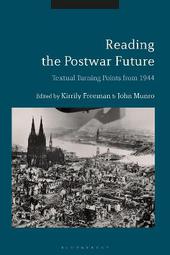
|
Reading the Postwar Future: Textual Turning Points from 1944
Paperback / softback
Main Details
| Title |
Reading the Postwar Future: Textual Turning Points from 1944
|
| Authors and Contributors |
Edited by Kirrily Freeman
|
|
Edited by John Munro
|
| Physical Properties |
| Format:Paperback / softback | | Pages:256 | | Dimensions(mm): Height 234,Width 156 |
|
| Category/Genre | Literature - history and criticism
Literary studies - from c 1900 - |
|---|
| ISBN/Barcode |
9781350196353
|
| Classifications | Dewey:809.044 |
|---|
| Audience | | Tertiary Education (US: College) | |
|---|
| Illustrations |
5 bw illus
|
|
Publishing Details |
| Publisher |
Bloomsbury Publishing PLC
|
| Imprint |
Bloomsbury Academic
|
| Publication Date |
17 June 2021 |
| Publication Country |
United Kingdom
|
Description
This original collection explores a number of significant texts produced in 1944 that define that year as a textual turning point when overlapping and diverging visions of a new world emerged. The questions posed at that moment, about capitalism, race, empire, nation and cultural modernity gave rise to debates that defined the global politics of their era and continue to delineate our own. Highlighting the goals, agendas and priorities that emerged for artists, intellectuals and politicians in 1944, Reading the Postwar Future rethinks the intellectual history of the 20th century and the way 1944's texts shaped the contours of the postwar world. This is essential reading for any student or scholar of the intellectual, political, economic and cultural history of the postwar era.
Author Biography
Kirrily Freeman is Associate Professor of History at Saint Mary's University, in Halifax, Canada. Her publications include Bronzes to Bullets: Vichy and the Destruction of French Public Statuary, 1940-1944 (2009). John Munro is Lecturer of US History at the University of Birmingham, UK. His publications include The Anticolonial Front: The African American Freedom Struggle and Global Decolonization, 1945-1960 (2017).
Reviews[Kirrily Freeman and John Munro] are to be commended on a judicious selection and on their choice of a novel frame through which to examine a significant historical moment. * E-International Relations * This outstanding collection of essays engages with a variety of texts, broadly conceived, that mark the distinct character of 1944. It is an interdisciplinary and international volume that assesses the way in which the selected texts set out the crisis constituted by '1944' and examines their visions for a postwar world that went beyond what had preceded it. The scope and range of the contributions is exciting, intriguing, and innovative. The conversations between the chapters, which the volume curates around the themes of representation, decolonization, reconstruction, and emancipation, are truly thought-provoking. * Gurminder K Bhambra, Professor of Postcolonial and Decolonial Studies, University of Sussex, UK * There are few moments in human history when alternative futures seem genuinely possible. As Reading the Postwar Future shows, 1944 was such a moment. This fascinating collection of essays about a wide range of thinkers who wrote original works in 1944, from libertarians like Friedrich Hayek to Marxists like Howard Fast, illustrates that 1944 is a year worth returning to time and again as we seek to rethink our own future. * Andrew Hartman, Professor of History, Illinois State University, USA * Engaging a diverse array of texts published in 1944, the essays in this volume convincingly make the case for the ways that the looming end of World War II and the as yet undecided character of the new world order engendered competing and expansive visions of the postwar future. As the institutional settlements of 1945 are fracturing, Reading the Postwar Future will be an indispensable guide to our own predicaments. * Adom Getachew, Neubauer Family Assistant Professor of Political Science and the College, University of Chicago, USA *
|